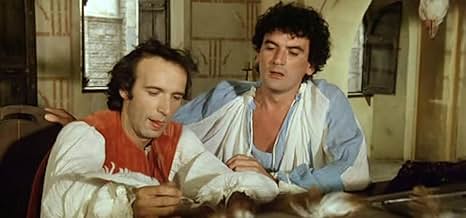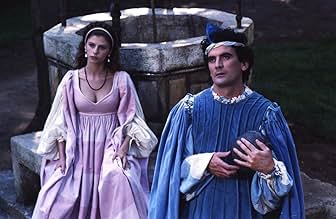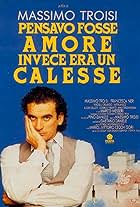IMDb RATING
7.6/10
7.6K
YOUR RATING
In the 80s, two friends misteriously wake up in the XV century and clumsly try to intermingle with the society of the time.In the 80s, two friends misteriously wake up in the XV century and clumsly try to intermingle with the society of the time.In the 80s, two friends misteriously wake up in the XV century and clumsly try to intermingle with the society of the time.
- Awards
- 1 nomination total
Featured reviews
Non ci resta che piangere is an amazing movie. The plot may seem a bit improvised, but that movie is much more than just an excuse for some hilarious gags. It contains all the philosophy of Benigni and Troisi, and presents all the different aspects and approach to life of Neapolitans and fiorentini personalities, away from stereotypes (as usual!). It is one of the funniest movies ever, and still, it makes me cry (maybe because I can't help thinking about Troisi, Napoli's best artist of the late XX century). It is a movie many people should see, but when I travel overseas I find it almost impossible to find in rental shops, or wherever.
10p13r0
Two actors at their best (Roberto Benigni before he became big-headed after the world wide fame and the late lamented Massimo Troisi) playing a strange story, where these two young modern men wake up in 1492 after spending a night out because their car broke down.
Settled in the italian reinassance, pretty well depicted despite the low budget used, the movie is substantially a collection of sketches based on the struggles that the two men must fight against the different lifestyle, with some secondary stories based on historical personages lived in that time (Savonarola, Columbus, Da Vinci). This is one of the most beloved italian movie of all the times, and everybody saw this movie can remember all of the most famous dialogues (Vitellozzo after the death of his brother, the "remember that you shall die!" speech, the scene at the customs, and many others) by hearth, as they were funny and innovative.
Directed with a very slow rhythm, that adds a quite poetic touch to the story, this movie must be considered as a small masterpiece, a comedy unique of its kind. Comparing this with one of the later italian comedy should be done to understand the meaning of the term "good taste".
Unluckily, anybody without a very fluent italian can't completely enjoy this movie, because a big part of the funny side of this movie follows from the two heavy accents of the two main actors, mainly the one of Troisi.
Settled in the italian reinassance, pretty well depicted despite the low budget used, the movie is substantially a collection of sketches based on the struggles that the two men must fight against the different lifestyle, with some secondary stories based on historical personages lived in that time (Savonarola, Columbus, Da Vinci). This is one of the most beloved italian movie of all the times, and everybody saw this movie can remember all of the most famous dialogues (Vitellozzo after the death of his brother, the "remember that you shall die!" speech, the scene at the customs, and many others) by hearth, as they were funny and innovative.
Directed with a very slow rhythm, that adds a quite poetic touch to the story, this movie must be considered as a small masterpiece, a comedy unique of its kind. Comparing this with one of the later italian comedy should be done to understand the meaning of the term "good taste".
Unluckily, anybody without a very fluent italian can't completely enjoy this movie, because a big part of the funny side of this movie follows from the two heavy accents of the two main actors, mainly the one of Troisi.
Roberto Benigni and Massimo Troisi are two of the most important Italian comedians of their generation, who ended up being recognized internationally with their masterpieces, "La vita è bella" by Benigni (1997) and "Il Postino" by Troisi (1994), the latter consecrated after his death.
Until they reached the pinnacle of their careers, they went through a series of films where, assuming the role of comedians, they made funny comedies, but of limited content. It's a bit the fate of comedians, to make the public laugh until they finally get autonomy and courage to make a serious comedy, where the laughter is poetic and the wit is intelligent. These two ended up making it and getting the right recognition, which doesn't always happen.
In this four-hand project, the script is weak and even the comedy, with some amusing moments, relies more on the improvisation capacity of the two actors than on situations or previously written dialogues. Above all, it is worth by the natural grace of these two clowns, of unique quality, who are always a pleasure to see perform.
Until they reached the pinnacle of their careers, they went through a series of films where, assuming the role of comedians, they made funny comedies, but of limited content. It's a bit the fate of comedians, to make the public laugh until they finally get autonomy and courage to make a serious comedy, where the laughter is poetic and the wit is intelligent. These two ended up making it and getting the right recognition, which doesn't always happen.
In this four-hand project, the script is weak and even the comedy, with some amusing moments, relies more on the improvisation capacity of the two actors than on situations or previously written dialogues. Above all, it is worth by the natural grace of these two clowns, of unique quality, who are always a pleasure to see perform.
10pneruda
One of the best comedies ever done in the film history. Benigni and Troisi a couple that can hardly be repeated. Money doesnt necessarily make great films...and great films do not always need loads of money. This is a great example.
"Non ci resta che piangere" is definitely a piece of art, directed by two of the most important Italian comedy writers: Benigni and Troisi. This is the work of a Napolitan and a Tuscan comic put together to make a film that'll make you laugh from its start and if you start, you'll never stop.
The plot is very simple: Mario and Saverio, a teacher and a janitor in an elementary school, find them in the year 1492 and it is the origin of all the funny situations you'll find in the movie.
The language used by Mario and Saverio is Italian, but Mario uses a typical Naples accent and Saverio it's using his Tuscan influence, so the language they use is crucial to the final meaning of the movie.
In the original version there was an additional scene, that the directors had to cut off when publishing the movie, despite this the movie is still very funny, and is its freshness, its lack of bad words what makes it a good comedy and a good film.
Ending, I think this movie is one of the best ever produced in Italy, but unfortunately, due to its dialectal language and the direct speech it can't be translated to other languages.
The plot is very simple: Mario and Saverio, a teacher and a janitor in an elementary school, find them in the year 1492 and it is the origin of all the funny situations you'll find in the movie.
The language used by Mario and Saverio is Italian, but Mario uses a typical Naples accent and Saverio it's using his Tuscan influence, so the language they use is crucial to the final meaning of the movie.
In the original version there was an additional scene, that the directors had to cut off when publishing the movie, despite this the movie is still very funny, and is its freshness, its lack of bad words what makes it a good comedy and a good film.
Ending, I think this movie is one of the best ever produced in Italy, but unfortunately, due to its dialectal language and the direct speech it can't be translated to other languages.
Storyline
Did you know
- TriviaThe screenplay is the main guideline for the film but many dialogues were improvised by Troisi and Benigni.
- Quotes
[last lines]
Saverio: Look! A train! I told you we would return to the present!
Mario: I'm not marrying Gabriellina!
Saverio: Oh yes you are!
Leonardo da Vinci: Engineers! TRAIN!
Leonardo da Vinci: For God's sake! 33%... 33%... and 33%...
[cut to a shot of the train and freeze as the film ends]
- ConnectionsEdited into Bellissimo: Immagini del cinema italiano (1985)
- SoundtracksNel blu dipinto di blu
Written by Domenico Modugno and Franco Migliacci
- How long is Nothing Left to Do but Cry?Powered by Alexa
Details
Contribute to this page
Suggest an edit or add missing content

Top Gap
By what name was Nothing Left to Do but Cry (1984) officially released in Canada in English?
Answer























